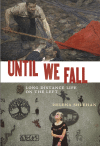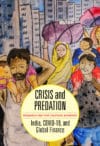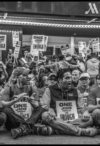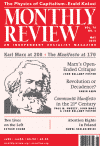
Until We Fall: Long Distance Life on the Left
Offers vivid first hand accounts of encounters with fellow socialists following the fall of the Soviet Union
Most westerners glimpsed the breakup of the Soviet Union at a great distance, through a highly distorted lens which equated the expansion of capitalism with the rise of global democracy. But there were those, like Helena Sheehan, who watched more keenly and saw a world turning upside down. In her new autobiographical history from below, Until We Fall, Sheehan shares what she witnessed first-hand and close-up, as hopes were raised by glasnost and perestroika, only to be swept away in the bitter and brutal counterrevolutions that followed.
In Until We

Superexploitation and the Imperialist Drive of Capitalism: How Marini’s ‘Dialectics of Dependency’ Goes beyond Marx’s ‘Capital’
Andy Higginbottom analyzes the influence of Ruy Mauro Marini on dependency theory and the concept of superexploitation. Marini, he explains, carried Marx’s legacy forward—but there is still work to be done in the twenty-first century. | more…
Anatomy of a Propaganda Campaign: Jeremy Corbyn’s Political Assassination
Jeremy Corbyn, the former leader of the British Labour Party, was subjected to a concerted propaganda campaign by the British right-wing military-industrial establishment and amplified by mainstream media. | more…

The Synthesizing Impulse: J. B. S. Haldane
By any standards, John Burdon Sanderson Haldane (1892–1964) was a fascinating man. An eminent scientist, prolific writer and speaker, fiery political activist, and all-round colorful character, he has been the subject of several full-length biographies and multiple biographical sketches. | more…

A Commodius Vicus of Recirculation
Encountering Marx and Joyce
“In the mid-1990s, when I lived in central London, I used to walk past the British Museum nearly every day. More often than not, I would pop in, did so for years, getting thrilled by a couple of things. The first was entering the great Reading Room, for which I had a Reader’s Card, glimpsing and even sitting in space G-7. I never ordered any books, had no need to order anything; all I wanted was to sit there, in Karl Marx’s seat, and try to feel the vibe. Usually, there was no vibe, only the hushed shuffling and page turning of others close by, mixed with the odd cough and splutter.” | more…

Crisis and Predation: India, COVID-19, and Global Finance
With the advent of COVID-19, India’s rulers imposed the world’s most stringent lockdown on an already depressed economy, dealing a body blow to the majority of India’s billion-plus population. Yet the Indian government’s spending to cushion the lockdown’s economic impact ranked among the world’s lowest in GDP terms, resulting in unprecedented unemployment and hardship. Crisis and Predation shows how this tight-fistedness stems from the fact that global financial interests oppose any sizable expansion of public spending by India, and that Indian rulers readily adhere to their guidance. Meanwhile, under the banner of reviving private investment, India’s rulers have planned giant privatizations, and drastically revised laws concerning industrial labor, the peasantry, and the environment—in favor of large capital. | more…

The Mexican and Latino Question
What Is to Be Done?
In his book Chicano Communists and the Struggle for Social Justice, Enrique M. Buelna examines the life of Ralph Cuarón, a Mexican-American or Chicano seaman, furniture maker, father, husband, and lifelong activist who joined the Communist Party at age 19 during the Second World War. The Communist Party, however, largely ignored Mexican workers and local members were not pleased with his organizing of that segment of the working class. In the early twenty-first century, the Mexican question remained, although it became known as the “Latino question” after considerable immigration from Central America in the 1980s and ’90s. In their book The Latino Question: Politics, Labouring Classes, and the Next Left, Armando Ibarra, Alfredo Carlos, and Rodolfo D. Torres deconstruct the word Latino, arguing that it homogenizes an extremely diverse population. | more…

Science and Politics
Hilary Rose, a sociologist, and Steven Rose, a neuroscientist, were two of the principal founders of the British Society for Social Responsibility in Science in the late 1960s in London. They speak about their work as scientists and antiwar activists, particularly around the issue of Palestinian liberation. | more…

Shamrocks and Oil Slicks: A People’s Uprising Against Shell Oil in County Mayo, Ireland
County Mayo, Ireland, is spectacularly beautiful. Dolphins, whales, and seals frolic in bays, rivers teem with salmon. Into this tranquil, unspoiled region, in early 2002, came Shell Oil, announcing plans to build a gas refinery. Shell promised wonderful things: new jobs, improved roads, money for schools. Church officials called this project a “godsend,” while honest, hard-working families, who had lived in Mayo for generations, certainly saw no harm in the project. But when the citizens of County Mayo realized what Shell actually intended to do, they rose up. Shamrocks & Oil Slicks tells the story of County Mayo—the fishermen, farmers, teachers, business people—who, motivated by love for their environment, their community, and their country, fought one of the planet’s most powerful destroyers to a standstill. | more…

Beyond Boundaries
In 1952, Selma James wrote the classic pamphlet A Woman’s Place and, in 1972, she and Mariarosa Dalla Costa published their groundbreaking The Power of Women and the Subversion of the Community, which discussed how women’s unpaid housework and care work is crucial to the production of the working class and, thus, the economy as a whole, launching the domestic labor debate inside the women’s movement. That same year, the International Wages for Housework Campaign was formed. In an interview with Ron Augustin at her home in London, James spoke of her political activities and years with C. L. R. James, whom she was with for more than twenty-five years, each with their own political activities but also sharing important struggles. | more…

Capitalism and Mental Health
The psychoanalytical framework developed by Marxist Erich Fromm strongly challenges the dominant biological and individualistic explanations of the mental-health crisis that is now sweeping the globe. Fromm emphasized that all humans have certain needs that must be fulfilled in order to ensure optimal mental health. It follows that capitalism is crucial to determining the experience and prevalence of mental well-being, as its operations are incompatible with true human need. | more…

May 2018 (Volume 70, Number 1)
The neoliberal restructuring of U.S. higher education is widely recognized, but nonetheless treated superficially and piecemeal in most left analyses, with little critical understanding of its inner political-economic logic. It is here that American observers have the most to learn from their British counterparts. | more…